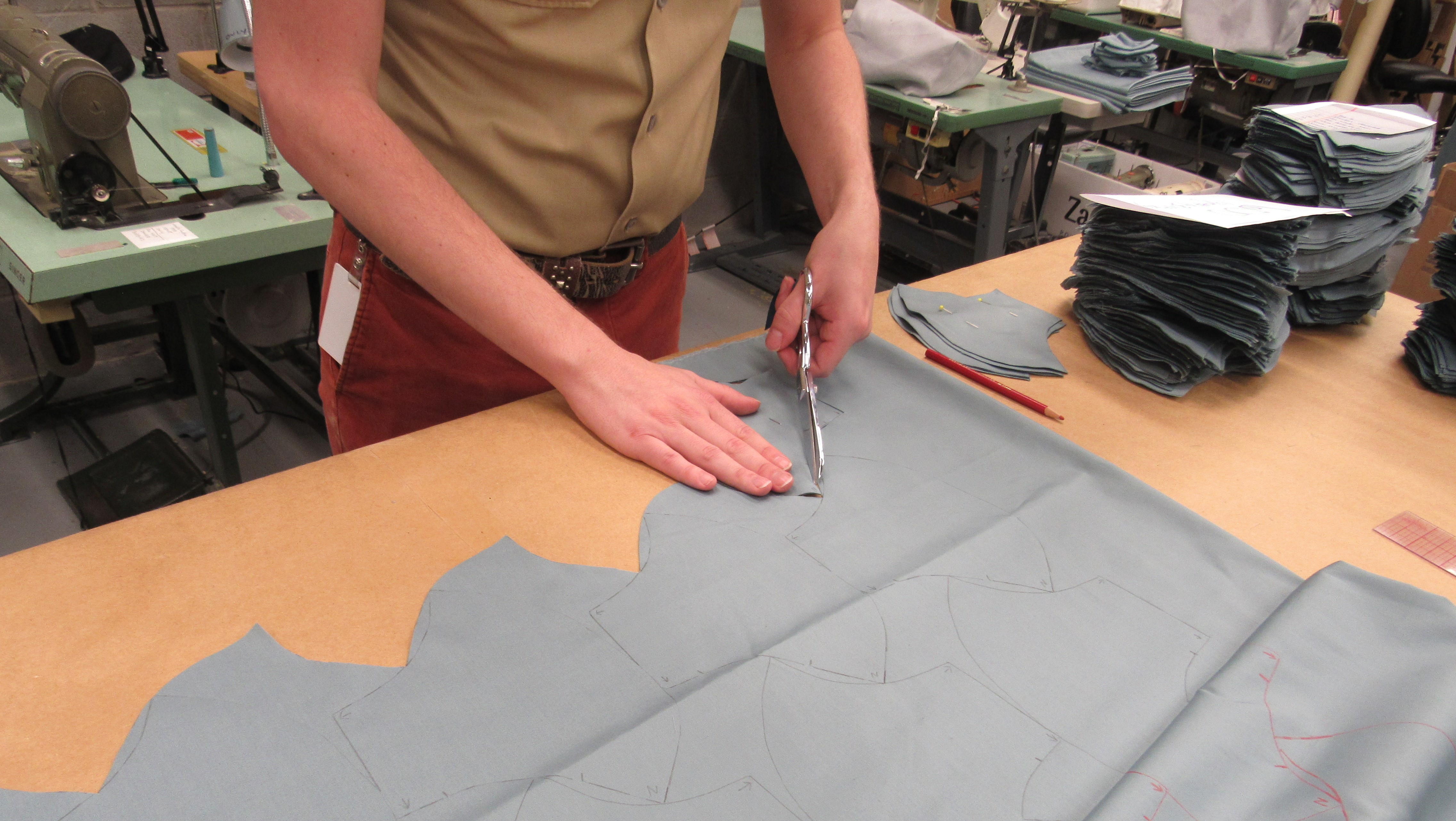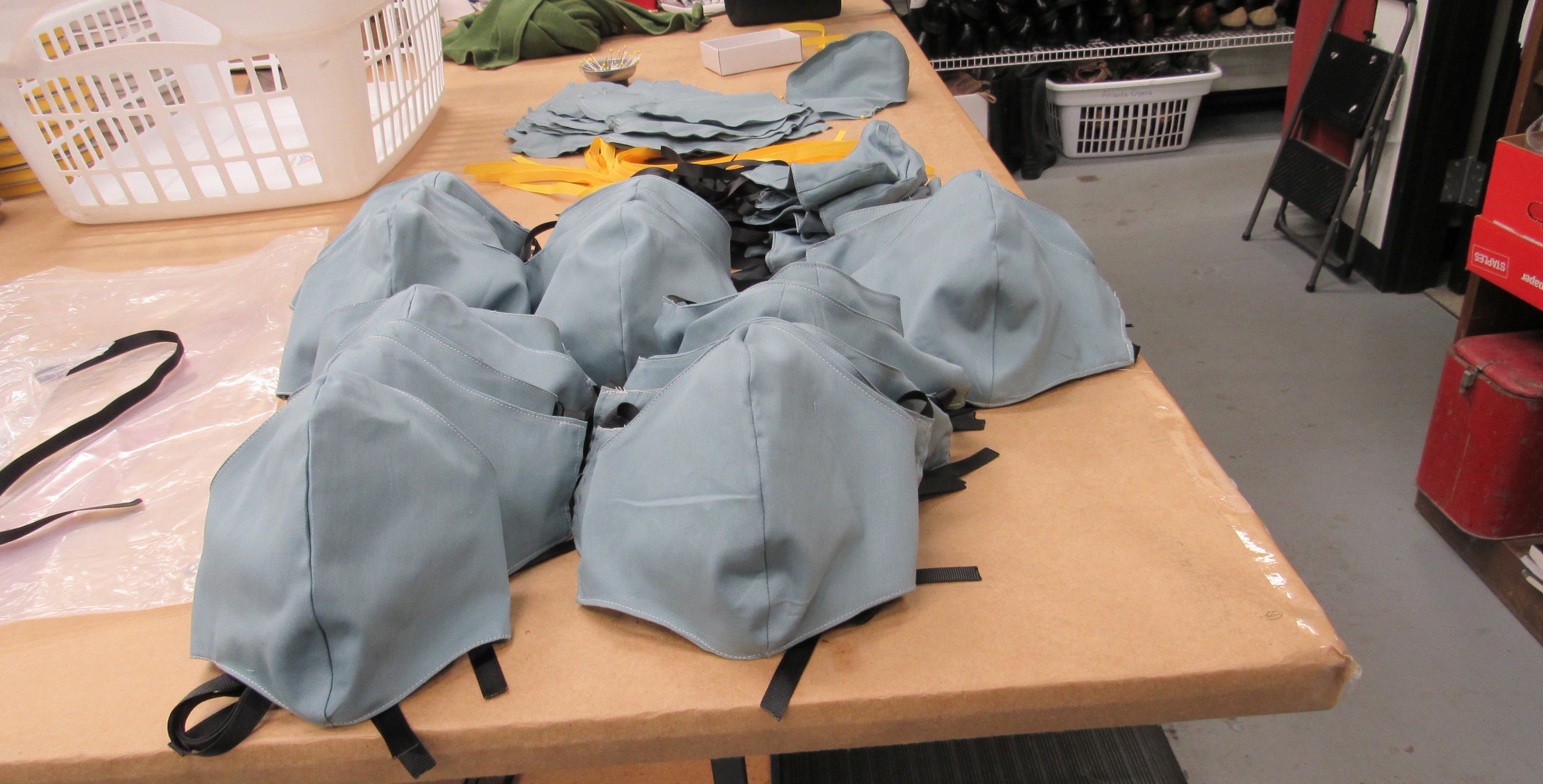Lawyers and Atlanta Opera team up to create covers for N95 masks for local hospital

Photo courtesy of the Atlanta Opera.
Micah Fortson was in the throes of crisis management at the Atlanta Opera when he received an email from a colleague in Europe asking how companies could help the medical industry during the COVID-19 pandemic.
Fortson, the opera’s managing director and also a lawyer, remembered that email later as he contemplated what canceling upcoming performances would mean for the production staff. Could the opera keep them employed if they didn’t have anything to do?
He and his colleagues began brainstorming and realized that their idle costume shop could be repurposed to help with the nationwide shortage of personal protective equipment. On March 20, they contacted Grady Memorial Hospital—the city’s largest hospital and only level 1 trauma center—and volunteered to start making covers for N95 medical masks.
“It’s a fabric covering that goes over the mask, because once these things get soiled, they have to throw them away,” Fortson says. “They can reuse them over and over again until they get blood or urine or dirt or something on them. It was paramount to them to be able to protect these respirators.”
As they received instructions for the covers and created prototypes for the hospital, Fortson understood the opera also needed legal protection before the project could move forward. He asked Charlie Sharbaugh, of counsel in the Atlanta office of Carlton Fields and a member of the Atlanta Opera’s board of directors, to help with insurance coverage.
And, at the same time, Howard Palefsky, another member of the opera’s board, emailed Brett Tarver, an associate at Troutman Sanders in Atlanta who handles pharmaceutical and medical device product liability litigation. Palefsky serves with Tarver on the Atlanta Symphony Orchestra’s board of directors and asked if her firm could help limit the opera’s legal liability.
“So, we put together this team of attorneys from Carlton Fields and Troutman Sanders to start looking at how we could protect the opera and allow us to mobilize to get as many of these masks produced as possible,” Fortson says.
Sharbaugh recruited Carlton Fields shareholder Gail Podolsky and associate Amanda Proctor, who are both in the firm’s Atlanta office, to join the pro bono project and negotiate with the opera’s insurance company.
“The insurance company was so moved by what the opera is doing, they said ‘we’ll include that in the coverage,’” Sharbaugh says. “So, they ended up with products liability coverage at no charge.”
Victoria Alvarez, an associate and commercial litigator in the Charlotte, North Carolina, office of Troutman Sanders, answered Tarver’s call to help with the project. She drafted an emergency supplies agreement that detailed the terms and conditions that guided production and use of the covers.
Brandon Woods, a partner with experience in commercial contracting, who is also in Charlotte, volunteered to review the agreement. Robert Browne, a partner in Chicago who practices in intellectual property, provided guidance on Food and Drug Administration regulations involving medical devices.

Photo courtesy of the Atlanta Opera.
The team asked Troutman Sanders Strategies, the firm’s lobbying and public affairs group, for Centers for Disease Control and Prevention guidance. They also consulted with attorneys from Pepper Hamilton, which will merge with Troutman Sanders in July.
“It was like a lasagna of protection, there were a lot of layers,” Tarver says. “We wanted to protect the opera from potential personal injury lawsuits down the road and from product liability issues. We also wanted to protect them from FDA regulatory enforcement.
“And at the end of the day, we wanted to make sure the agreement between the hospital and the opera protected the opera from any potential liability that maybe the hospital would later claim, in regards to the product that they were making.”
The attorneys, who first spoke to Fortson about the covers on March 23, moved quickly and produced final documents within four days—another remarkable feat from Sharbaugh’s perspective.
“I can’t stress enough how all of the lawyers just jumped on it,” he says. “Starting on Monday and ending on Thursday, we had a completely negotiated document and endorsement, all of which were then signed. Especially when you consider the fact that two institutions were involved, a hospital and an insurance company, that’s pretty amazing.”
With the agreement in place, the Atlanta Opera plans to produce about 72,000 covers for masks. Grady sent 60 boxes of operating room sheets, which will be ironed, cut into pieces and sewn together by nearly a dozen opera employees.
Fortson, who hopes to deliver the first batch of covers this week, says it was important for him and his colleagues at the Atlanta Opera to think creatively and help their community in this way.
“We serve the community by giving them an emotional outlet, entertainment, and we were essentially robbed of our ability to do that in this COVID-19 pandemic,” he says. “We were all feeling this vacuum of mission work and thinking, what are the community needs right now?
“That’s essentially where we went, the medical community is who needs support. That’s how we can have the most impact.”
As a participant in arts organizations in Atlanta, Tarver values the benefits they bring to their community. She was moved by the opera’s commitment to help others, despite its own financial struggles.
“I wanted to help with that effort in any way that I could,” she says. “As attorneys, we have a lot of skills and tools that non-lawyers don’t have. Even though we are all busy, if we can help provide legal protections for community organizations that are jumping in to aid our community, especially our health care workers during this time, I find it personally rewarding to use my lawyer skills for that.”
Write a letter to the editor, share a story tip or update, or report an error.


